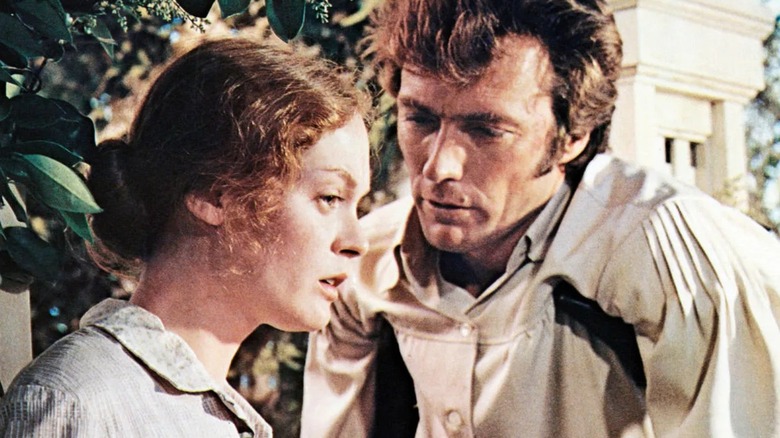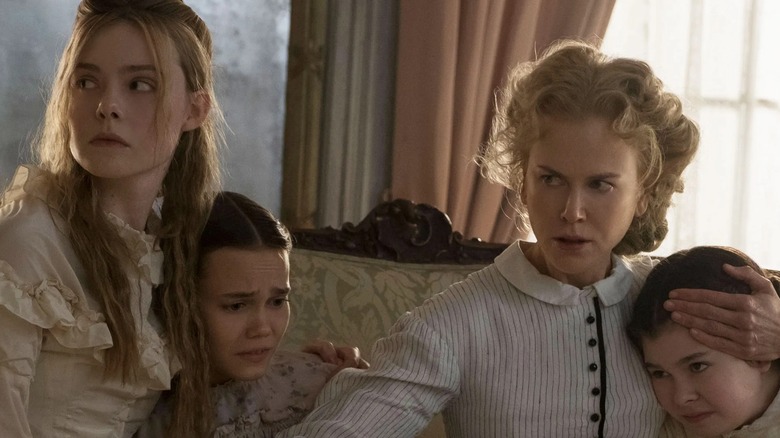Why Sofia Coppola Remade One Of Clint Eastwood's Most Controversial Movies
Thomas P. Cullinan's 1966 Southern Gothic novel, "The Beguiled," is a story about women. Here, the all-female residents of a seminary in Virginia are rattled by the arrival of a wounded Union soldier at the height of the Civil War, and what he might represent for each of them. This man, Corporal John McBurney, appears to be harmless at first but sets off an unsettling chain of events that incite rage, envy, and resentment among the women (and children). The slow-burn novel jumps across perspectives, helping us piece together a dizzying, suspenseful tale about the fallout of war, and how it extends to the secluded residents of the seminary.
However, Cullinan's agonizingly slow narrative grants agency to his female characters only in relation to McBurney, as their individual wants and desires vanish the moment he's not around. There is some interiority weaved in when the events culminate in acute tragedy, but Cullinan paints the concept of femininity in broad, horribly shallow strokes. It is a novel about women, written by a man who is only interested in fleshing them out through the narrow lens of heteronormative desire and jealousy. Solidarity and sisterhood are foreign to the premise of "The Beguiled," and any adaptation worth its salt would undoubtedly have to address and remedy this glaring issue without foregoing complexity.
Don Siegel and Clint Eastwood teamed up to bring "The Beguiled" to life in 1971 to extremely controversial effect. Although critics panned the release due to its misogynistic, sexploitation bent, Eastwood opined that the film bombed due to poor marketing and his attempt to play against type (which, in his case, was lone wolf-heroism and stoic masculinity). Siegel and Eastwood's take on the novel feels rather superficial, the focus being on McBurney's (manipulative) sexual charm and how it provokes the most violent, dangerous impulses in the women surrounding him. Although Eastwood's McBurney is meant to be an unsavory predator, his victims are etched as caricatures, pale shadows of who they are meant to be.
More than 40 years after the film's release, Sofia Coppola decided to remake "The Beguiled" with women at the forefront of the grisly Gothic horror tale.
Sofia Coppola's take on The Beguiled is also terribly controversial
Coppola's "The Beguiled" premiered at the Cannes Film Festival in 2017 and immediately made an impact with a historic Best Director win. However, this adaptation became laced with controversy from the get-go: although the film was superior to the 1971 version in its treatment of femininity and female agency, it seemed to have deliberately evaded intersectionality. The only Black character from the novel, Mattie, is visibly missing from the film, and Edwina, a biracial woman in the source material, is portrayed by Kirsten Dunst in this adaptation. Coppola justified some of these choices in a statement published on IndieWire:
"There are many examples of how slaves have been appropriated and 'given a voice' by white artists. Rather than an act of denial, my decision of not including Mattie [the only Black character in the novel] in the film comes from respect [...] Some have said that it is not responsible to make a film set during the Civil War and not deal directly with slavery and feature slave characters. I did not think so in preparing this film, but have been thinking about this and will continue to do so."
Coppola also went on to state that she did not wish to "perpetuate an objectionable stereotype" that was embedded within the source material, which informed her decision to focus solely on "male and female power dynamics that could relate to all women." Although the intent to not regurgitate harmful stereotypes is understandable, the story of "The Beguiled" is only half complete when the perspectives of characters of color are completely left out. It is a feminist perspective that is not inclusive at all, with Coppola eliminating an integral layer of race-based politics in a Civil War narrative set in the Confederate South.
What Coppola's version of the film brings to the table
If you're able to overlook these grave missteps, then Coppola's version is certainly more surefooted and empowering than the Eastwood adaptation, as it does not approach female sexuality from a fetishistic lens. It reinvents the source material by investing depth into female characters who were originally written to evoke cheap sensationalism, and Coppola takes a languid, measured approach to the evolving story. In an interview with The Film School Rejects, the director explained why she had decided to remake the controversial 1971 film:
"When I saw the movie it was so fascinating to me that these macho filmmakers — Don Siegel and Clint Eastwood — would make a story set in a girl's school in the South. It's such a male point of view of a group of women that I thought 'Okay, I want to tell that story from the women's point of view' [...] I felt like I had to give these women a voice, and then I thought to flip it over from their point of view and [show] women during wartime; you always see stories about men at war, but I don't think I've seen what happens to the women left behind."
Moreover, Coppola's film improves upon the novel's psycho-dramatic aspects by unearthing the rot beneath sophisticated facades. Colin Farrell plays Corporal John McBurney in this iteration, and his callous treatment of the women feels more pointed and jarring because of his guileless facade. However, this flawed feminist reinterpretation suffers from the same pitfalls as the novel it is based on: we see very little of who these women are outside of their tempestuous, complex feelings for the only man in their vicinity.
Perhaps, it is best if we collectively leave "The Beguiled" behind as a novel worth adapting, and focus on the countless women-centered stories that actually deserve to be brought to life.


